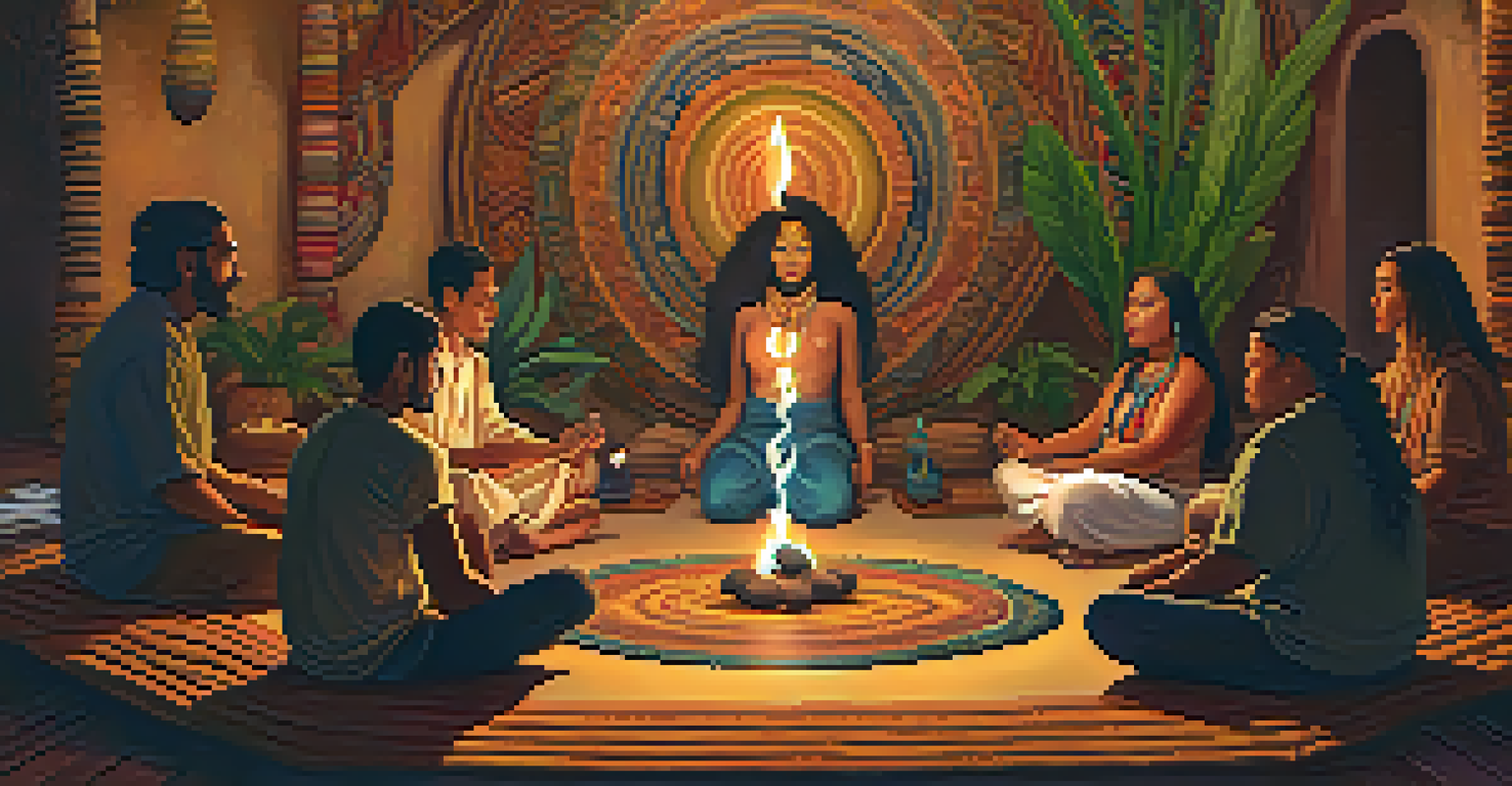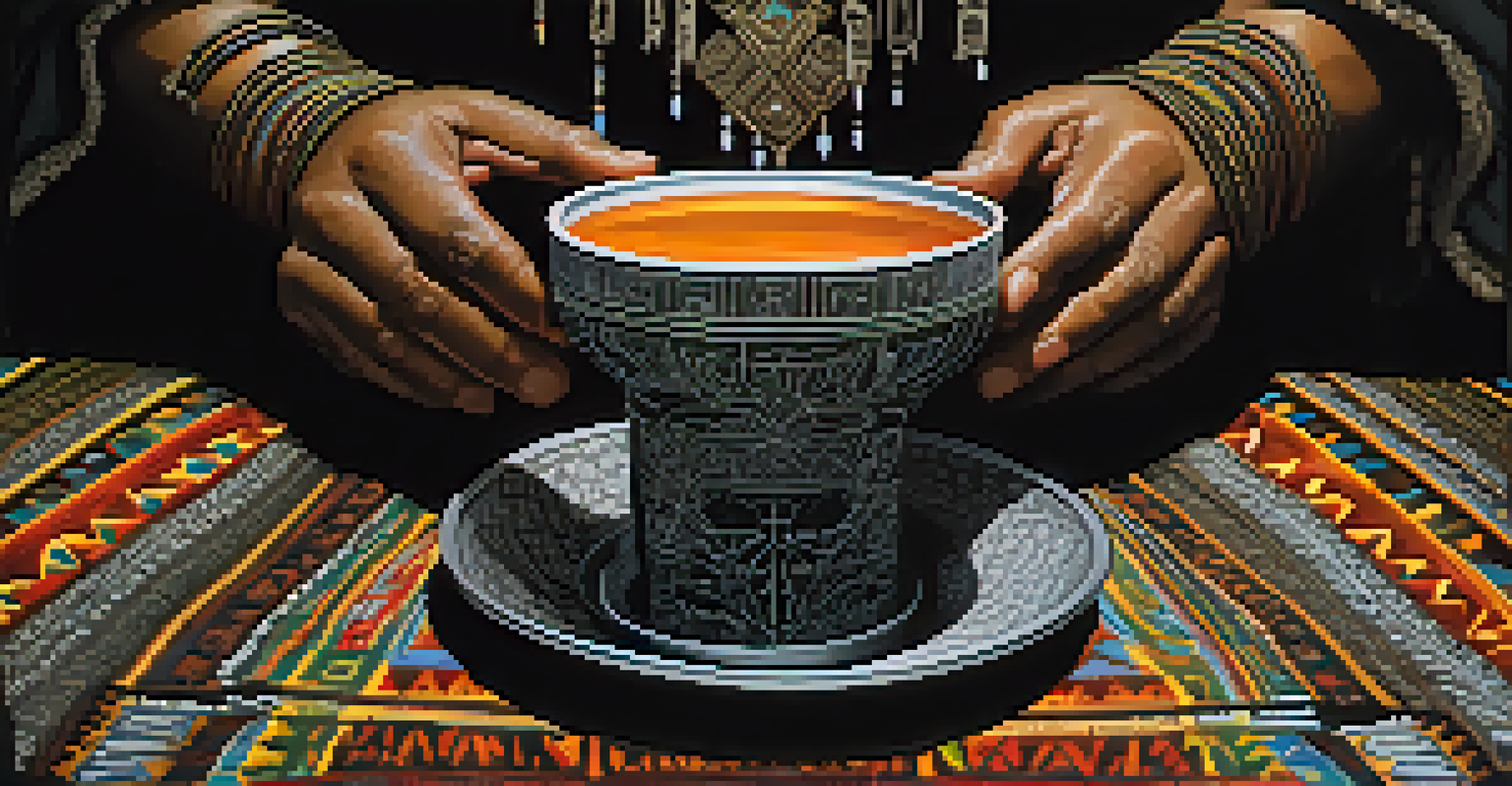The Role of Shamans in Ayahuasca Rituals and Healing

Understanding Ayahuasca and Its Cultural Significance
Ayahuasca is a powerful plant medicine made from the leaves of the Psychotria viridis and the vine Banisteriopsis caapi. Used for centuries by indigenous tribes in the Amazon, it serves not only as a healing tool but also as a spiritual sacrament. The brew is often consumed in a ceremonial context, where it is believed to facilitate deep introspection and connection to the spiritual realm.
The shaman is not just a healer but a bridge between the physical and spiritual realms.
The cultural significance of Ayahuasca extends beyond its psychoactive properties; it is deeply intertwined with the identity and traditions of various Amazonian tribes. For these communities, the rituals surrounding Ayahuasca are sacred, often involving a shaman who acts as a mediator between the physical and spiritual worlds. This connection highlights the importance of respecting and preserving indigenous knowledge and practices.
As interest in Ayahuasca grows globally, it’s crucial to understand its cultural roots and the role of shamans in these rituals. Without this understanding, the experience can be stripped of its true meaning, reducing a profound spiritual practice to mere entertainment or escapism.
The Shaman: A Guide Through the Ayahuasca Experience
In Ayahuasca rituals, the shaman plays a pivotal role as a guide and healer. These individuals are often seen as spiritual leaders, possessing knowledge passed down through generations. They prepare the Ayahuasca brew and lead participants through the journey, using songs, chants, and rituals to create a safe and supportive environment.

The shaman’s knowledge extends beyond just the physical act of brewing Ayahuasca; they understand the intricacies of the experience, including the emotional and psychological challenges participants may face. This understanding allows them to provide essential support, helping attendees navigate their journeys effectively. Their presence can be calming, reassuring participants that they are not alone in their experience.
Ayahuasca's Cultural Importance
Ayahuasca is not just a psychoactive brew; it embodies the spiritual and healing traditions of indigenous Amazonian tribes.
Furthermore, shamans often incorporate traditional healing practices into the ceremony. This can include herbal remedies, energy work, and even personal insights based on their own spiritual journeys, enriching the healing process and providing a holistic approach to wellness.
The Healing Power of Ayahuasca Under Shamanic Guidance
Ayahuasca is renowned for its therapeutic potential, addressing various psychological and emotional issues. Many participants report profound insights, emotional releases, and a deeper understanding of themselves during these ceremonies. The shaman's role is crucial in facilitating this healing, as they help create a sacred space for transformation.
Ayahuasca is not just a medicine; it is a teacher that reveals the truth within.
While the brew itself is powerful, it is the shaman’s guidance that often amplifies its effects. They intuitively sense the energy in the room and can adjust their approach based on participants’ needs. This might involve altering the music, offering words of encouragement, or providing physical support during intense moments of the journey.
Moreover, the shaman helps participants integrate their experiences post-ceremony. This integration is vital for lasting change, as the insights gained during the ritual can be overwhelming. By discussing these experiences with the shaman, participants can better understand their revelations and how to apply them in their daily lives.
The Role of Song and Icaros in Ayahuasca Rituals
One of the unique aspects of Ayahuasca ceremonies is the use of songs known as icaros. These sacred chants are integral to the ritual and are believed to carry healing energy that guides participants through their journey. The shaman uses icaros to invoke spiritual assistance, protect participants, and enhance the overall experience.
Each icaros is often specific to the shaman’s lineage and personal experiences, making them deeply personal expressions of healing. As the shaman sings, participants may find themselves resonating with the sounds, allowing the music to lead them deeper into their subconscious. This auditory aspect can often evoke strong emotions, facilitating healing and understanding.
Role of the Shaman
Shamans serve as vital guides in Ayahuasca ceremonies, using their extensive knowledge to facilitate healing and support participants through their journeys.
The power of icaros lies in their ability to connect participants to the spiritual world while providing comfort and support. This connection underscores the shaman's role as a bridge between the physical and metaphysical realms, reinforcing the importance of their guidance throughout the Ayahuasca experience.
Shamanic Training: A Lifelong Journey
Becoming a shaman is not a quick process; it often requires years of training and personal development. Many shamans undergo rigorous apprenticeships, learning the traditions, songs, and healing techniques from their elders. This training is not just about knowledge; it also involves personal healing and spiritual growth, ensuring that they are prepared to guide others.
Shamans frequently engage in their own Ayahuasca ceremonies, using the experience to deepen their understanding and connection to the medicine. This continuous journey of self-discovery equips them with the insights needed to assist others effectively. Their personal experiences inform their practice, allowing them to offer a unique perspective during ceremonies.
Ultimately, the path of a shaman is one of dedication and service. They commit to helping others heal and grow, often at the expense of their own comfort. This deep sense of responsibility highlights the profound respect and reverence that is central to the role of a shaman in Ayahuasca rituals.
Ethical Considerations in Ayahuasca Healing
As interest in Ayahuasca expands beyond its traditional context, ethical considerations come to the forefront. It’s essential to approach Ayahuasca ceremonies with respect for the indigenous cultures that have safeguarded this practice for centuries. Shamans must not only be skilled healers but also aware of the cultural implications of their work.
Participants should seek out experienced shamans who honor the traditions and ethics of Ayahuasca use. This means ensuring that shamans are not exploiting the practice for commercial gain but rather approaching it with integrity and respect. Ethical shamans prioritize the well-being of their participants, creating a safe and nurturing environment for healing.
Ethics in Ayahuasca Practices
As interest in Ayahuasca grows, it's crucial to approach its use with respect for indigenous cultures and ensure ethical practices in healing environments.
Furthermore, understanding the importance of consent and informed decision-making in these settings is crucial. Participants should be empowered to ask questions, express concerns, and feel comfortable throughout the process. This mutual respect fosters a more authentic and transformative healing experience.
The Future of Ayahuasca and Shamanism
As the popularity of Ayahuasca grows globally, the future of this ancient practice is filled with both promise and challenges. While it offers immense potential for healing, there’s a risk of commodification and dilution of its spiritual essence. Ensuring that the voices of indigenous shamans are heard and respected is paramount in preserving the authenticity of Ayahuasca rituals.
In the face of increasing interest, it is crucial for practitioners and participants alike to advocate for ethical practices and cultural sensitivity. This involves supporting indigenous communities and their right to share their knowledge on their terms. By fostering these relationships, a more sustainable model of healing can emerge that honors the roots of Ayahuasca.

The future of Ayahuasca and shamanism can be bright if approached with respect, understanding, and collaboration. By recognizing the vital role shamans play and valuing their expertise, we can create a more inclusive space for healing that benefits both individuals and the cultures that have nurtured this profound tradition.